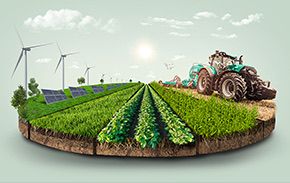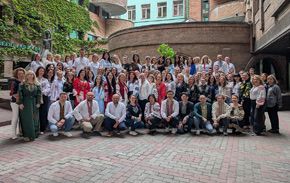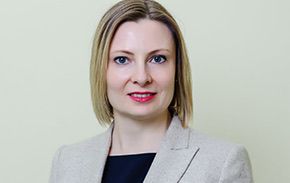“Bankers should know well what the milking machine and plough mean”, considers Jean-Jacques Herve. “Otherwise, they won’t have a chance in agricultural sector”.
Jean-Jacques Herve is an academician at the Academies of Agrarian Sciences of France, Russia and Ukraine, Board counsellor on agricultural issues at the Credit Agricole Group (France). An agronomist by profession, he has worked in CIS countries for the last 15 years. Herve was a counsellor on agricultural issues at the Ukrainian government. He is the author of the book on Russian agriculture “From kolkhoz to hypermarket” (2007). In the interview to the “AgroMarket” newspaper, Jean-Jacques Herve told about issues banks face working with an agricultural sector.
Mr Herve, how difficult is it to win confidence of the Ukrainian agricultural producer?
Earlier I was a counsellor of the Minister for Agriculture of Ukraine and used to organise meetings with the representatives of French banks, in particular, with Philippe Guidez, who then had been occupying a position of chairman at Credit Agricole for a year and a half. In conversation with the minister Philippe summed up that ordinary banks don’t know much about agriculture peculiarities. At that time we agreed that I would contribute to Credit Agricole Ukraine’s better understanding of agriculture.
We started with staff education at 207 Ukrainian Credit Agricole outlets; we took them to fields, farms. Previously, some bank employees had no idea of what the milking machine and plough mean. And how, at this rate, can the agricultural sector be financed? The second by priority issue is: how can risks be reduced not only for us, but also for our customers, as occasionally they require a loan much exceeding normal needs.
As a result of the conducted field researches and farmer poll, we’ve got a right framework to analyse potential of our customers. At the current moment we go on studying the way enterprises split their land bank into intensive and non-intensive parts. If the average yield in a country is lower than expected – that’s because not all the enterprises possess enough financial resources for the intensification of their production. We are greatly interested in the reason one enterprise can raise the level of yield, while another fails.
We suppose partnerships, meaning, who buys crop, milk and fruits from the enterprise and who sells fertilizers, seeds and the other stuff to it, to be the key factor in this process. We help partners to develop long-term relations and build trust between people, since it is an integral part of any relationship. Unfortunately, we know perfectly well, that Ukrainian farmers are leery of banks and insurance companies. Therefore, we try to prove step-by-step, that we are reliable enough to deal with.
How big is the banks’ confidence towards agricultural companies?
Occasionally we doubt the reliability of official documents. Results of statistics analysis are striking as cost price turns out to be equal everywhere. Though, it’s impossible, since cost price stands on the on-the-spot decisions. Cost price varies widely, and we are aware of the fact; it’s diverse within Ukraine as well as within France. There are companies able to produce pork at the price of 15 UAH per kg live weight, but there are also those unable to do that at the price of less than 22 – 23 UAH. Which category will get a loan? - Of course, the first one, while the second one will be scrutinized. We won’t give a mere ‘no’ response to farmers: even if an agreement isn’t signed, resolutions, made by experts during evaluation of production, will be clarified. Our answer will be: “Well, we believe you could better control growth of pigs having repaired buildings, ventilation. How are you going to improve your production in the framework of existing economy? You can’t launch business from scratch; you can’t invest, though a step forward is feasible”.
Occasionally, such an explanation is rather useful and may bring results. There are people we met again following their completion of our recommendations.
Too bad, there are no competent advisory services in Ukraine as people strive to plan, debate and search the Internet. And this is a very crucial point. I do like when producers seek improvement and practical knowledge: “How can I reduce cost of producing a litre of milk or kilo of meat? How can I improve grain production? How can I raise the level of yield up to six tons? Or how to keep yield at five tons but decrease cost price?”. Margin may turn out to be optimal based on five ton yield, not the six one – that is to be examined and tested. If we see enterprises are considering improvement, it becomes the first source of confidence.
What future holds for Ukrainian landowners regarding long-term loans?
Talking about long-term UAH loans (for instance, for 10 years), who can forecast UAH rates in 10 years? How can we consider devaluation risk, currency risk etc.? Therefore, enterprises in Ukraine can be subdivided into two groups: the first one – foreign registered companies (in London or Luxembourg), long-term FCY financial resources are available for them; while the second group includes all the other companies with a limited access to the international capital markets.
Exporters, collecting currency proceeds, usually get currency loans, as they are almost two times cheaper. Situation with medium business is more tangled as medium enterprises either don’t export production or do it in small amounts, therefore, they can get a loan in UAH exclusively.
Loans to enterprises producing milk and meat are very problematic as such kind of production requires large investments before a company starts to get benefit. Therefore, repayment period should be taken into consideration; during this period farm’s production should bring a sustainable income. Nevertheless, it is complicated nowadays, since milk price fluctuates between 2 UAH per litre in summer and 5 UAH per litre in winter. Milk projects are put back by instability factor. Anyway, we try to settle this issue in the framework of partnership.
It’s necessary to have stock instruments at disposal to promote long-term products. This year we’ve organized a meeting of our Ukrainian customers with the OECD experts (Organisation for Economic Co-operation and Development). Two years ago we entered into cooperation with Euronext and explained the way futures work to our customers. They take an interest in that. Unfortunately, at the moment being futures can’t be suggested to 100% of enterprises without foreign capital, but we do believe the corresponding possibilities will come soon.
Print version

 Useful information
Useful information
 Useful information
Useful information
 Useful information
Useful information
 Useful information
Useful information
 Useful information
Useful information
 Useful information
Useful information
 Useful information
Useful information
 Useful information
Useful information
 Useful information
Useful information
 Useful information
Useful information
 Useful information
Useful information
 Useful information
Useful information
 Useful information
Useful information
 Useful information
Useful information
 Useful information
Useful information






